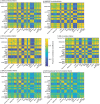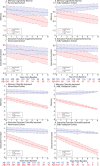A robust harmonization approach for cognitive data from multiple aging and dementia cohorts
- PMID: 37502020
- PMCID: PMC10369372
- DOI: 10.1002/dad2.12453
A robust harmonization approach for cognitive data from multiple aging and dementia cohorts
Abstract
Introduction: Although many cognitive measures have been developed to assess cognitive decline due to Alzheimer's disease (AD), there is little consensus on optimal measures, leading to varied assessments across research cohorts and clinical trials making it difficult to pool cognitive measures across studies.
Methods: We used a two-stage approach to harmonize cognitive data across cohorts and derive a cross-cohort score of cognitive impairment due to AD. First, we pool and harmonize cognitive data from international cohorts of varying size and ethnic diversity. Next, we derived cognitive composites that leverage maximal data from the harmonized dataset.
Results: We show that our cognitive composites are robust across cohorts and achieve greater or comparable sensitivity to AD-related cognitive decline compared to the Mini-Mental State Examination and Preclinical Alzheimer Cognitive Composite. Finally, we used an independent cohort validating both our harmonization approach and composite measures.
Discussion: Our easy to implement and readily available pipeline offers an approach for researchers to harmonize their cognitive data with large publicly available cohorts, providing a simple way to pool data for the development or validation of findings related to cognitive decline due to AD.
© 2023 The Authors. Alzheimer's & Dementia: Diagnosis, Assessment & Disease Monitoring published by Wiley Periodicals, LLC on behalf of Alzheimer's Association.
Conflict of interest statement
The authors declare no competing interests. Author disclosures are available in the supporting information.
Figures




References
-
- Ellis KA, Bush AI, Darby D, et al. The Australian Imaging, Biomarkers and Lifestyle (AIBL) study of aging: methodology and baseline characteristics of 1112 individuals recruited for a longitudinal study of Alzheimer's disease. Int Psychogeriatrics. 2009;21:672‐687. doi:10.1017/S1041610209009405 - DOI - PubMed
Grants and funding
LinkOut - more resources
Full Text Sources
